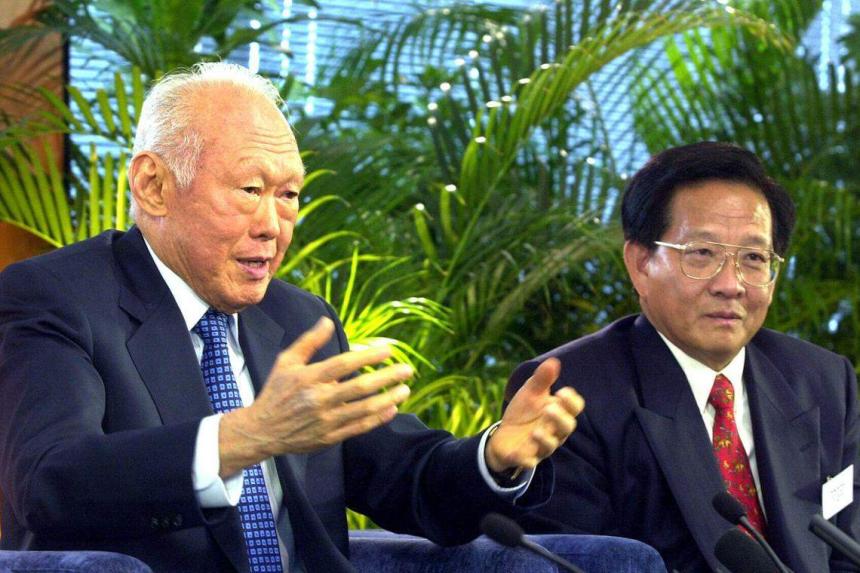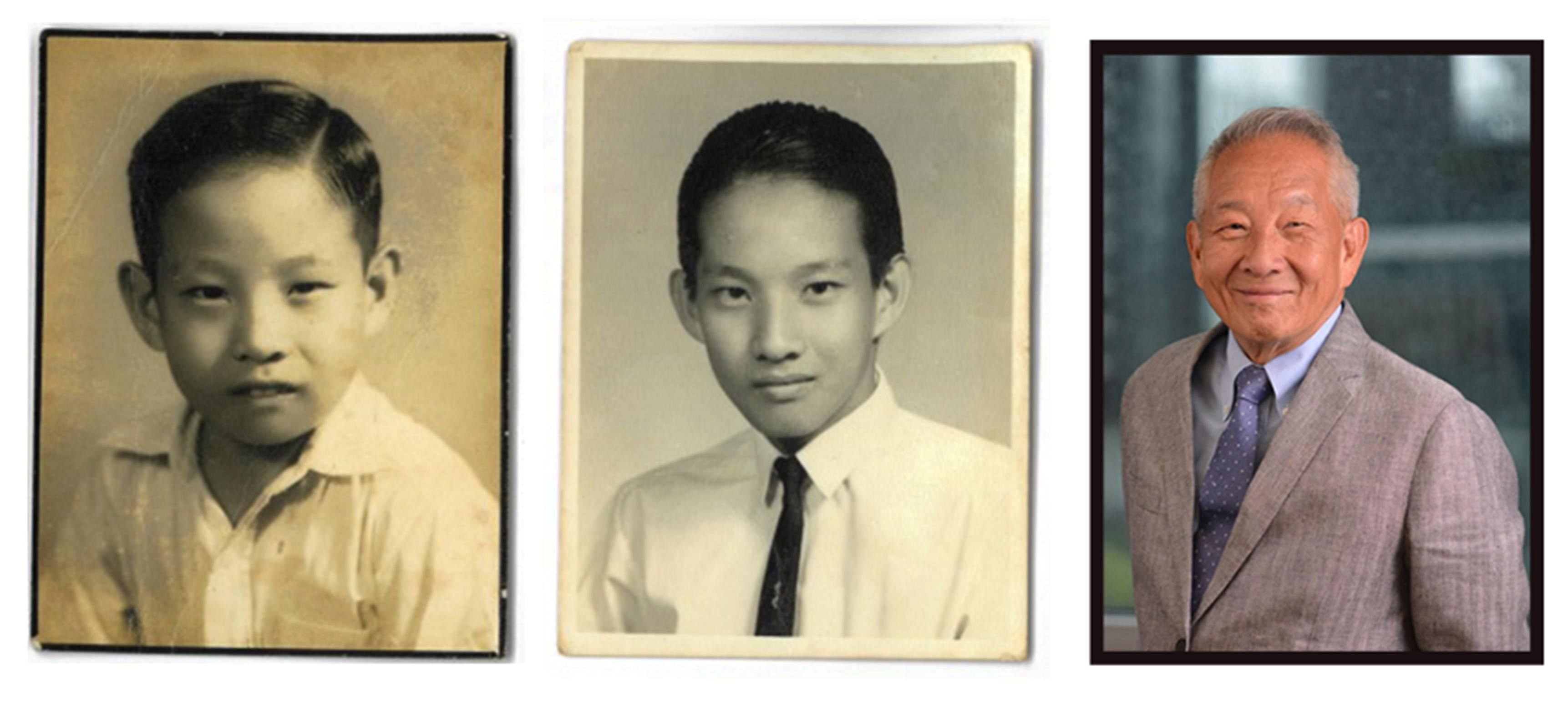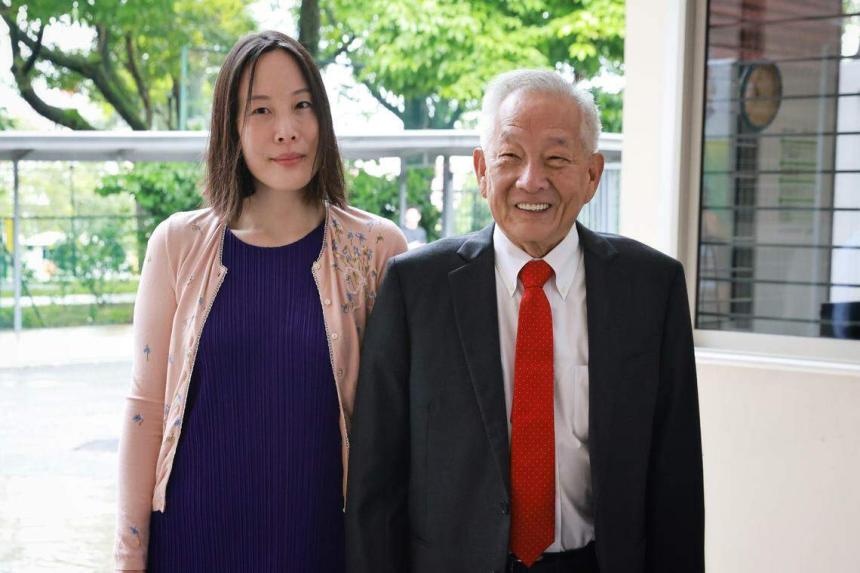SINGAPORE - Mr Ng Kok Song flashes his pearly whites when told that many people think the president of Singapore is but a figurehead and a toothless tiger.
“I just had a new set of teeth, so not toothless,” quips the 75-year-old former GIC chief investment officer, who announced his intention to run for president last Wednesday.
Turning serious, he says: “You are wrong, the president is not a toothless tiger. The president can bite – and should bite at certain times.”
Mr Ng – who was the founder and chairman of the Singapore International Monetary Exchange before joining GIC – then carefully breaks down the role of the president: to be “the second key when the need arises to use past reserves”, and to rise above politics and “unify the people of Singapore”.
The latter, he emphasises, is extremely important because Singapore, like the rest of the world, is grappling with increasing polarisation in political attitudes and affiliations, as well as differences in views and opinions.
While differences should be respected, he says they should not be allowed to deteriorate into divisions in society.
No less critical is the president’s power to veto key public service appointments.
“The president has the power, if necessary, to intervene in order to uphold the integrity of key public service holders. And we have seen recently how important that can be.”
Mr Ng was referring to the recent spate of controversies – the Ridout saga and the inappropriate relationship between former Speaker of Parliament Tan Chuan-Jin and former Tampines GRC MP Cheng Li Hui – which have dogged the ruling People’s Action Party.
“There were concerns about the integrity of our national institutions, political office-holders and Members of Parliament,” Mr Ng says.
These disturb him because it will make it only more difficult to attract capable and good people to join political office.
“The price is very high, not only in terms of economic earnings, but also the public scrutiny that they have to go through,” he says.
“We need the best of good and capable people to come forward to serve the country, and I’m not talking just about the Government but also the opposition, because a good opposition makes a good Government better.”
That is one of the reasons he is running: to set an example and tell the younger generation to put fear aside.
“If I, at 75 years old, can still come forward to serve my country, you, too, should also do so,” says Mr Ng, who is now executive chairman of investment firm Avanda Investment Management, which he founded in 2015. In February 2022, Bloomberg reported that the firm’s assets were worth around US$10 billion (S$13.3 billion).
Another reason is his belief that Singapore’s political governance needs to find a new equilibrium.
“We should try to reduce the over-concentration of power, and the presidency is a good place to start because the president is the head of state, he is separate from the Government, he must rise above politics. So I think a good start in coming to a new equilibrium in Singapore politics is to have a president who has not been affiliated with any political party,” he says.
Hence, rumours that he was put up by the Government to split the votes sadden him.
“No one put me up to this,” he says emphatically. “I put myself up to this because I’m the one who’s going to be most involved, and who has the most to sacrifice.”
Mr Ng, who will be applying for eligibility based on his public service experience, adds: “I’m doing this because it is for the good of our country. It is good for the credibility of the office of the president that there should be an election.”
Under the public sector route, individuals have to have been in certain roles in the public service, or have held the most senior executive post in one of the entities listed on the Fifth Schedule of the Constitution.
Fifth Schedule entities include, among others, the Central Provident Fund (CPF) Board, the Housing Board, Temasek and GIC.
He applauds serial entrepreneur George Goh for coming forward as a presidential candidate.
“The more good people we have coming forward, the better it is for Singapore. And I like the way he characterised himself as the Mao Shan Wang (of presidential candidates),” he says, referring to the prized durian varietal.
Grinning, Mr Ng quips: “I’d prefer to be characterised as teh kosong, you know, Kok Song – kosong. Teh kosong is tea without sugar, a healthier, better option than Mao Shan Wang.”
The idea of throwing his hat into the ring came four months ago, prompted by three events.
The first was a series of interviews he gave about Singapore’s reserves, which he helped to build and invest. Questions asked ranged from the sources of the reserves – “the Government’s accumulated budget surpluses over the years, CPF savings, and capital inflows into Singapore” – to how they were invested and why they are of strategic importance to Singapore.
“And, of course, the answer is that our reserves are our savings for a rainy day, it is our financial defence against future uncertainties, and it’s what we draw on in times of emergencies such as during the pandemic.”
Having to respond to these fundamental questions and explain them in simple language because the interviews were meant for the public led him to think he may have a role to play. After all, safeguarding Singapore’s reserves is one of the critical roles of the elected president.
The second event has to do with another interview he gave to commemorate the 100th anniversary of the birth of founding prime minister Lee Kuan Yew.
Mr Ng not only worked with Minister Mentor Lee, who was chairman of GIC for 30 years until 2011, but also made headlines about 15 years ago as “the Christian friend” who taught MM Lee how to meditate.

Mr Ng shared then about an episode involving his late wife Patricia – who had stomach cancer and died, one month short of her 57th birthday, in his arms on Valentine’s Day in 2005 – and MM Lee.
“One day, she was undergoing chemotherapy at the hospital, and she said: ‘Kok Song, I would like to write a letter to Mr Lee.’ So I said: ‘What for?’ She said: ‘Nothing to do with you. You just deliver the letter for me.’’’
He recites the contents of said letter: “Dear Minister Mentor Lee, every year, when National Day approaches, I had meant to write a letter of appreciation to you, but could not find the courage to do so. Last month, I was diagnosed with terminal stage stomach cancer and this could well be my last National Day. So I’m writing to you to thank you, to say how blessed people of my generation, Kok Song and I, how blessed we are to have lived in this country because of what you’ve done for this country. You’ve lifted us out of poverty, and you made us all proud to be Singaporeans. So I want to thank you for your vision, for your leadership and for your self-sacrificing work.”
MM Lee’s reply – which Mr Ng says showed his “tender and compassionate side” – came two days later, thanking Patricia for writing the letter despite her serious illness.
“When I read those letters to the interviewer, I just felt this sense of gratitude that Patricia had. So I kept turning in my mind: ‘How can I say thank you the way Patricia would thank Mr Lee and the people of Singapore for what we have received in our life?’”

The third catalyst was former senior minister Tharman Shanmugaratnam, who announced he was running for president on June 8.
“Tharman said he would very much like to be elected, but there must be some competition so that he can say he became president with a mandate from the people. So when I read that, I kept thinking: ‘Who in Singapore can give Tharman a decent contest? This thought then came to me in my mind: ‘Why not you, Kok Song? Why not you?’”
After all, Mr Ng has an inspiring background and an impressive 45-year career in public service.
The second of 11 children of a fish auctioneer and a housewife, he grew up in the fishing village of Kangkar, which has since morphed into the satellite estate of Sengkang East. Home – until he got married at 24 – was a shabby two-bedroom house with a thatched roof and mud floor. Money was often tight, so his mother sometimes had to borrow from neighbours, the memory of which still saddens him.

The family’s circumstances forced him, early in life, to take on responsibilities and be mature beyond his years. He had to wake up early each morning to help his father sort fish into different baskets, look after the family’s 80 chickens, and mind his siblings while juggling his studies at Montfort School.
Despite that, he was a stellar student, winning a scholarship to study engineering in Canada after his A levels. Unfortunately, he had to give that up because around that time, his father lost his voice and hence, lost his job.

Mr Ng then took up a Public Service Commission (PSC) scholarship to study physics at the University of Singapore, while working as a tutor so that he could support the family.
With a chuckle, he recalls attending a job interview with the PSC after graduating in 1970.
“The chairman of the panel said: ‘You studied physics. We’re not going to build a nuclear station in Singapore, so would you like to go and work in the meteorological department to help us forecast the weather?’”
Instead, Mr Ng ended up in the Ministry of Finance’s overseas investment department under the late deputy prime minister Goh Keng Swee, who was known as the economic architect of Singapore.
Mr Ng did not even know what stocks were when he started the job, but he grew not just to love his job, but also to excel in it. Highlights of his career include heading the Monetary Authority of Singapore’s London Investment Office in the early 1970s, and becoming the founding chairman of the Singapore International Monetary Exchange in 1983, before joining GIC three years later and being appointed its chief investment officer in 2003.
Along the way, he was conferred several honours, including the Chevalier de la Legion d’Honneur in 2003, and the Officier de l’Ordre national du Merite in 2011 by the French government for his contributions as a member of the strategic committee of Agence France Tresor from 2001 to 2014. The agency handles public debt and treasury management.

Sir Howard Davies – chairman of NatWest Bank in England and former deputy governor of the Bank of England – met Mr Ng at Stanford Business School in 1979.
“In class, he was fiendishly clever. Hardworking, though he tried to conceal it by always appearing laid-back,” says the 72-year-old economist, who also had a stint as an external member of the Investment Committee of GIC.
Mr Ng told him recently about his presidential plans.
Mr Davies says: “I had been wondering whether running a bond fund would satisfy him forever. I knew how committed he has always been to the future of the city-state, and we have often talked about the crucial importance of strong and stable governance and effective management (not something we have enjoyed in the UK in the recent past!). So I could immediately see the logic.
“And he has clearly thought through the implications of what would be a big step for anyone. Kok Song never does anything without careful analysis of the rewards and the risks.”
Indeed, Mr Ng is only too aware about the consequences of running for public office, including the intrusion on his privacy and that of his 45-year-old fiancee Sybil Lau who – together with his family – accompanied him to the Elections Department last Wednesday.
There is chatter – some negative and judgmental – on the Internet about the big age gap and what her background is.
Mr Ng, a father of three children aged between 33 and 50, nods knowingly and refers to an interview with The Straits Times in 2012 in which he said he had experienced so much love for his late wife that it was enough to last him a lifetime. However, he said in the same piece that he would not rule out falling in love again.
“The heart has its reason and reason does not know,” he says, quoting Blaise Pascal, the 17th-century French mathematician, physicist and philosopher.

Four years ago, Mr Ng was having mee pok tar in Joo Chiat Lane when he bumped into a friend, who said that Ms Lau wanted to meet him to discuss investing.
The elder of two daughters, Ms Lau was born in Vancouver to a Macau-born Canadian diplomat and his wife. Her maternal grandfather is the late John Cheung, who used to own Hong Kong property company Wheelock Marden.
A graduate of Canada’s Simon Fraser University, she worked, among other jobs, as a financial analyst at Goldman Sachs and an investment specialist at Credit Suisse before running her family’s investment fund.
Mr Ng recalls with a laugh: “At that time, I had started my investment company Avanda, so immediately my mind said, ‘prospective client’.”
Instead of making a pitch for some business when they met, he was “distracted”.
“We talked and talked, and then time’s up because I had another meeting,” he says. He then asked for Ms Lau’s number from his friend, who helpfully let on that she was single.

Mr Ng was overjoyed when she said she had no issues about their age gap and accepted his proposal six months later.
“At 71, there’s no time to lose,” quips Mr Ng, who has six grandchildren, aged between 11 and 19. “We wanted to get married, but then, Sybil’s mother died so, as is customary, we want to wait three years,” he says, adding that he hopes to walk down the aisle with Ms Lau in March 2024.
“My kids, when I first informed them – because I didn’t want them to hear from somebody else – said, ‘Oh, Dad, we’re so happy for you’. Maybe they were quite relieved that there is somebody else to help them take care of me.”
Asked why she fell for him, Ms Lau tells ST: “Over and over, I see Kok Song focused not on himself but on others. I see it in his filial piety, his humility, his kindness, his loyalty.”
“Even now, I know what he is going through is not for himself, but for Singapore,” adds Ms Lau, who sits on several boards including that of Well Health Technologies Corp, Canada’s largest owner and operator of outpatient health clinics, and SG Enable, a registered charity for the disabled.
The public scrutiny and the judgmental remarks are par for the course, Mr Ng acknowledges.
“It’s actually none of their business, except that now I am part of their business. And this is one of the sacrifices that Sybil and I have to make, because there’s going to be public scrutiny, or gossip. It cannot be helped,” says Mr Ng, adding that he has been asked if she was a gold-digger. “Well, the reality is that she’s got more money than me.”
He continues: “It meant so much to me when Sybil said: ‘Kok Song, this is going to expose me to a lot of public intrusion, but I understand your reasons, and I will stand by your side.’ What more can I ask?”
The conversation turns to meditation, which Mr Ng has been practising for about 35 years and which he thinks is a life skill everyone should pick up.

“It enables us to get in touch with this place of peace and harmony deep within ourselves and which cannot be found in the outside world. It helps to relieve stress because a lot of our stress comes from our preoccupation with our desires. When our desires are not met, we get frustrated.
“A lot of our stress comes from our concern about people’s opinions of us, what people think of us. A lot of our stress comes from our desire to control things, to have power, to have money,” he says, adding that he meditates for about 25 minutes, twice a day.
Meditation has been instrumental in shaping his decision to stand for the presidency by helping him to examine and “purify” his motives.
“Your mind can deceive you, but your heart tells you. It helped me a great deal to come to this realisation that if I do stand for president, it is because I really want to serve my country, I want to say thank you to the people of Singapore for what Singapore has given me, I want to honour Patricia, I want to honour Mr Lee Kuan Yew.”

